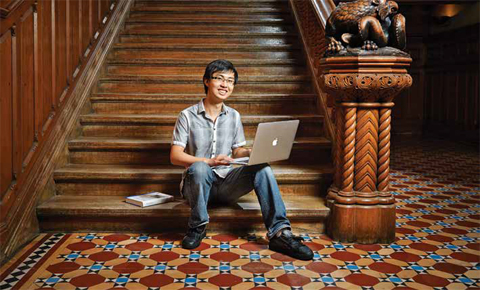James Yuan had long been certain he wanted to go away for university, and in the fall of 2012, the Calgary native fulfilled that goal when he began attending University College at U of T. What he was less clear about at that time, however, was how he would pay for it.
A $5,000 entrance scholarship, an academic merit scholarship from the government of Alberta, and the Registered Education Savings Plan his family had saved would cover his first year’s tuition. But using all his RESP funds in first year would mean the less-than-ideal prospect of working part time in subsequent years, or taking out hefty student loans.
In October of that first year, Yuan received some unexpected relief from his money woes: $2,300, courtesy of UC’s Katherine Ballantine Coutts Admission Scholarship, which is awarded annually to a student with financial need. The scholarship was established by the grandchildren of Coutts, a teacher and feminist, and is granted to a student from Essex or Kent County in southern Ontario, where Coutts lived and taught, or Alberta, where one of her sons settled. “Getting the scholarship was definitely a big help. It took away some of the financial burden,” says Yuan.
The Coutts scholarship is one part of a bigger strategy by U of T to provide more financial support to its students. Part of that approach involves the Boundless Promise program, through which the university matches, in perpetuity, the annual income generated by new endowed donations of $25,000 and up which establish scholarships for full-time undergraduates with financial need.
Yuan is now in the third year of his bioinformatics and computer science degree. Financial need-based scholarships “encourage more students to attend university,” he says, “and make it possible for them to focus on their studies without being distracted by a part-time job.”
| MEET THE DONORS The Coutts Family While five generations of her family went to U of T’s University College, Katherine Ballantine Coutts never had the opportunity to attend herself. But others now will: the professional and civic achievements of this early feminist have been recognized with a scholarship in her name established by her grandchildren.Born in 1855, Coutts came of age at a time when women were restricted from attending university, but as granddaughter Christine Clement (BA 1963 UC) explains, that didn’t stop Coutts from working as a schoolteacher and being active in organizations that assisted women with self-education, motherhood and household management. The Thamesville, Ontario resident also founded a memorial for Tecumseh, the famed Native American leader who fought and died in the War of 1812. For Clement, a professor emeritus in the department of astronomy and astrophysics, creating the scholarship was a way to honour her grandmother and reflect her connections to University College. Coutts’ modest financial background contributed to the decision to create a need-based scholarship, so future generations could attend university, regardless of their backgrounds. A growing endowment, currently at $63,700, funds one first-year scholarship of approximately $2,500 every year. “Katherine was community-minded and educated people all her life, so this scholarship memorializes what she achieved,” Clement says. |
Read all four stories in this series about gifts to the Boundless campaign and the powerful impact they are having:
| > Turning subject-matter experts into journalists > Ethiopia’s sixth pediatric surgeon will share what she’s learned > Ensuring educational choice for undergraduate students > The classroom of the future will help engineers get hands-on |






